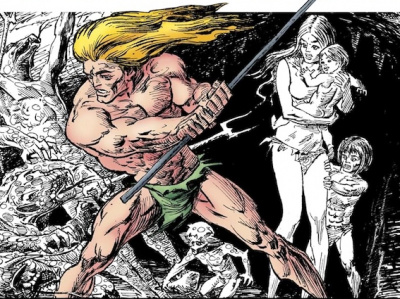Diamond Comics Distribution handles many different types of products: graphic novels, comics, toys, t-shirts, and key rings to name but a few. In general, especially given the large number of items that they move through their warehouses, Diamond does a fine job and is appreciated for their professionalism and good service.
One of Diamond's main purposes should be the facilitation of product availability from the publisher to the retailers. Indeed the only reason that retailers employ Diamond, and the only reason why publishers offer their products for distribution through Diamond is this service. Thus Diamond is responsible to retailers to get them their desired products, presuming that those products are offered through publishers working with them, and Diamond is responsible to publishers for maximizing the sales of those products and their timely delivery to retailers. Hence, anything that inhibits the smooth moving of products from publisher to retailer is detrimental to Diamond's responsibilities to both.
Ironically, Diamond's practices concerning reorders directly deter this system from working as it should. Diamond charges a 3% re-order penalty on all products that are not initial orders. Granted, some publishers are moved to pay this unreasonable penalty themselves. However, this does not detract from the fact that this penalty exists and is passed on as an additional surcharge to either retailers or publishers. As a direct result, retailers are discouraged from increasing their orders on products or re-ordering products from Diamond. This penalizes those publishers who use Diamond to move their products and thus directly abridges Diamond's responsibility to those publishers.
By discouraging retailers from selling more products, Diamond also abrogates its responsibility to retailers. By charging a penalty for re-orders, Diamond forces retailers to spend additional time finding other sources for products. In and of itself, this is not such a large problem, or rather is a self-correcting one. However, over time this penalty, especially now that recent discount changes have accentuated the cost of doing business with publishers through Diamond, will force retailers to move their business from Diamond to other distributors.
Retailers have little choice in this: we do not set terms between Diamond and its publishers. Retailers can accept the surcharge or find other distributors. The first path would result in lowered profits: the retailers would then have to cut staff or stock, which would inevitably cost them customers or even force them to close. The second path would be to seek out other distributors: pitting them against other types of retailers who have additional advantages granted through their very size and buying power, even though they lack the product knowledge or range of product, it need hardly be observed that if a retailer has to seek other sources for products that Diamond penalizes, they are just as likely to shift other business from Diamond, even those products that Diamond does not penalize.
The inclusion of a re-order penalty may have seemed justified when Diamond was made up of many warehouses in far-flung geographical locations. Back then, smaller print runs of publisher products forced Diamond to assume a large risk in keeping products available for an extended period of time. Also, in those days, veritable armies of employees were required to process orders.
Today only three warehouses remain. Improvements in publishing technology allow publishers to reprint products in a much shorter time period than in the past, thus reducing the requirements of warehousing large amounts of back stock and hence reducing the risk of unsold products. Finally, Diamond's laudable improvements in computerization have directly led a significant reduction in Diamond's staff. Thus if the reorder penalty was once justified by Diamond's higher costs in providing retailers backstock products, it would seem that justification has disappeared.
It comes down to this: Diamond's reorder penalty, in the short term, hurts both retailers and publishers by adding friction to the distribution process, and in the long term, hurts Diamond by sending revenue away and by weakening those retailers who remain.
It would behoove Diamond to roll back their recent discount changes and provide better service to both ends of the chain that they service. This will encourage more product to be channeled through Diamond: encouraging the sale of more products therefore benefits Diamond, while changes discouraging sales of products will hurt them. We hope that Diamond will see and understand the fairness of this argument and change their policies accordingly.
David M. Wheeler
Owner Dragon's Lair Comics & Fantasy
Austin, Round Rock, & San Antonio, TX
Rory D. Root
Comic Relief: The Comic Bookstore
Berkeley, CA
W. Alan Davis
Silver Bullet Comics
Wilkesboro, NC & Winston Salem, NC
Regan Clem
Clem's Collectibles
Ft. Wayne, IN
Jim Mortensen
Comix Revolution
Evanston, IL
Paul Stock
Librairie Astro
Montreal
Canada
Wayne McNeil
Gen X Comics & Games
Bedford, TX
Kelly Dowd
Redd Skull Comics & Cd's
Calgary, Alberta
Canada
John Tinkess, Manager
Another Dimension
Calgary, Alberta







